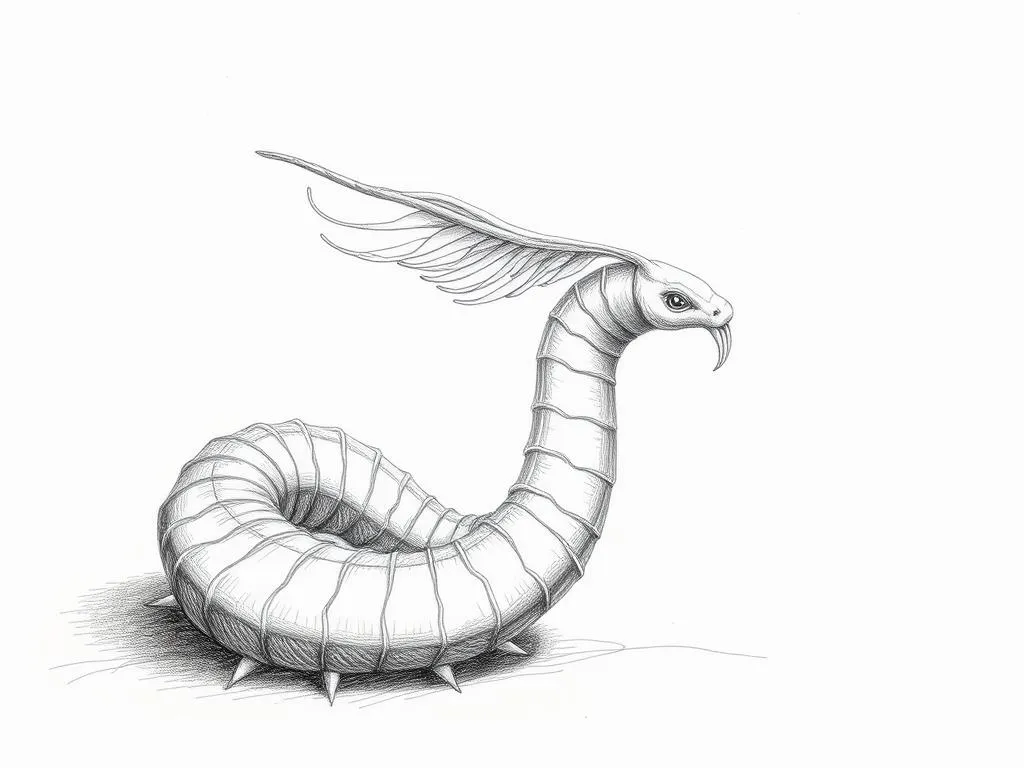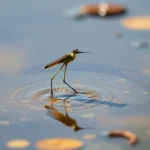The Hidden Depths of Worm Symbolism

Disclaimer: Some images on this website are AI-generated artworks and may not accurately represent real animals.
Worms, often overlooked and misunderstood, are fascinating creatures that play a significant role in our ecosystem and culture. This article delves into the worm symbolism and meaning, revealing the various interpretations and significance attributed to these humble beings throughout history and in modern contexts.
Understanding the Worm
Biological Overview
Worms belong to several different animal phyla, but the most commonly recognized are earthworms. These segmented invertebrates have a simple yet effective anatomy that allows them to thrive in various environments.
| Physical Characteristic | Description |
|---|---|
| Body Structure | Long, cylindrical body divided into segments |
| Skin | Moist, slimy cuticle aiding in respiration |
| Digestive System | Complete, consisting of a mouth, intestines, and anus |
| Movement | Uses muscles and bristles (setae) for locomotion |
Worms play a crucial role in the ecosystem. They aerate the soil, improve drainage, and promote nutrient cycling through their natural processes of consumption and excretion. Notably, different species of worms exhibit unique characteristics, such as the Lumbricus terrestris, commonly known as the common earthworm, which is renowned for its soil enrichment abilities.
Cultural Significance
Historically, worms have held various meanings across cultures. In some traditions, they symbolize the cycle of life and death, embodying the connection between the earth and the afterlife. In ancient Egypt, for example, the concept of regeneration was often linked to the earthworm, as these creatures facilitate the decomposition process essential for new life to flourish.
In folklore and mythology, worms are frequently depicted as symbols of transformation. In many cultures, they are seen as messengers from the underworld, bridging the gap between the living and the deceased. This rich tapestry of cultural significance enhances our understanding of worm symbolism and meaning.

Symbolism & Spiritual Meaning
Transformation and Renewal
The most profound aspect of worm symbolism lies in the themes of transformation and renewal. Worms are integral to the cycle of life and death, facilitating decomposition and enriching the soil for new growth. This process illustrates the essential nature of death in the cycle of life—nothing is wasted, and everything is recycled.
In spiritual contexts, worms often symbolize personal transformation. Just as they break down organic matter to create fertile soil, individuals may undergo personal trials and tribulations to emerge renewed and strengthened. This connection to renewal encourages us to embrace change and view challenges as opportunities for growth.
Humility and Grounding
Worms epitomize humility and the importance of foundational work. Their existence beneath the soil serves as a reminder of the value of being “down-to-earth.” In a world that often glorifies superficial achievements, worms teach us the significance of grounding ourselves and focusing on the essential, albeit less glamorous, tasks that contribute to our overall well-being.
This grounding aspect promotes a sense of stability and connection to the earth. Acknowledging the humble contributions of worms can inspire individuals to cultivate humility in their own lives, recognizing that every role—no matter how small—plays a vital part in the larger ecosystem.
Resilience and Adaptability
Worms are remarkable for their resilience and adaptability. They thrive in a variety of environments, from damp soils to decaying organic matter. This adaptability serves as a powerful symbol of perseverance and survival in challenging circumstances.
In spiritual terms, worms remind us of our ability to overcome obstacles and adapt to new situations. They encourage us to embrace resilience as a vital trait, teaching us that like worms, we can find ways to flourish even when faced with adversity.
Worms in Dreams
Common Dream Scenarios
Dreams involving worms can evoke a range of emotions and interpretations. Below are some common scenarios:
| Dream Scenario | Interpretation |
|---|---|
| Dreaming of worms in soil | Symbolizes hidden potential or growth |
| Seeing worms crawling on a surface | Represents feelings of anxiety or decay |
| Finding worms in food | Indicates concerns about nourishment or health |
| Watching worms transform into butterflies | Suggests personal transformation and renewal |
Interpretations of Dreaming About Worms
Dreaming about worms often reflects deep-seated feelings of decay or transformation. Such dreams may indicate a need to confront hidden fears or anxieties that may be eating away at one’s sense of security. The presence of worms can symbolize the need for introspection and self-examination, urging individuals to address unresolved issues in their lives.
Conversely, dreaming of worms can also signify personal growth and healing. The transformative nature of worms may suggest that the dreamer is undergoing a significant change, shedding old habits, or embracing new perspectives. This duality in interpretation highlights the complexity of emotions associated with worm symbolism and meaning.
Modern Interpretations
Worms in Popular Culture
In modern contexts, worms have been portrayed in various ways across literature, film, and art. They are often depicted as both beneficial and repulsive, embodying duality in their symbolism. For instance, children’s literature sometimes presents worms as friendly characters that assist with gardening, while horror films may portray them as creepy, unsettling creatures.
This duality reflects the complex relationship humans have with worms. On one hand, they are essential for soil health and agricultural practices; on the other, they evoke feelings of disgust or fear. This multifaceted representation encourages us to reconsider our perceptions and recognize the value of these creatures in our lives.
Environmental Awareness
Worms are vital for sustainable practices and environmental health. They play a crucial role in organic gardening and soil health, promoting nutrient cycling and improving soil structure. As awareness of environmental issues grows, understanding the importance of worms in maintaining a healthy ecosystem becomes increasingly relevant.
Incorporating worms into gardening practices, such as vermicomposting, not only enhances soil quality but also contributes to a more sustainable approach to waste management. This highlights how the symbolism of worms extends beyond spiritual meanings into practical applications that benefit our planet.
Key Takeaways
- Worms symbolize transformation and renewal, embodying the cycle of life and death.
- They represent humility and grounding, emphasizing the importance of foundational work in life.
- Resilience and adaptability are key traits associated with worms, reminding us of our ability to overcome challenges.
- In dreams, worms often reflect hidden fears or personal growth, serving as a prompt for introspection.
- Worms play a significant role in popular culture, embodying both positive and negative traits.
- Understanding the ecological importance of worms promotes environmental awareness and sustainable practices.
Conclusion
The symbolism of worms is rich and multifaceted, encompassing themes of transformation, humility, resilience, and adaptability. By exploring worm symbolism and meaning, we can gain valuable insights into our own lives and the natural world around us. Embracing the lessons embodied by these humble creatures can inspire personal growth and encourage a deeper connection with the earth. As we navigate our own journeys, let us remember the vital role that worms play in the cycle of life and the wisdom they impart on the importance of embracing change and nurturing our foundations.







